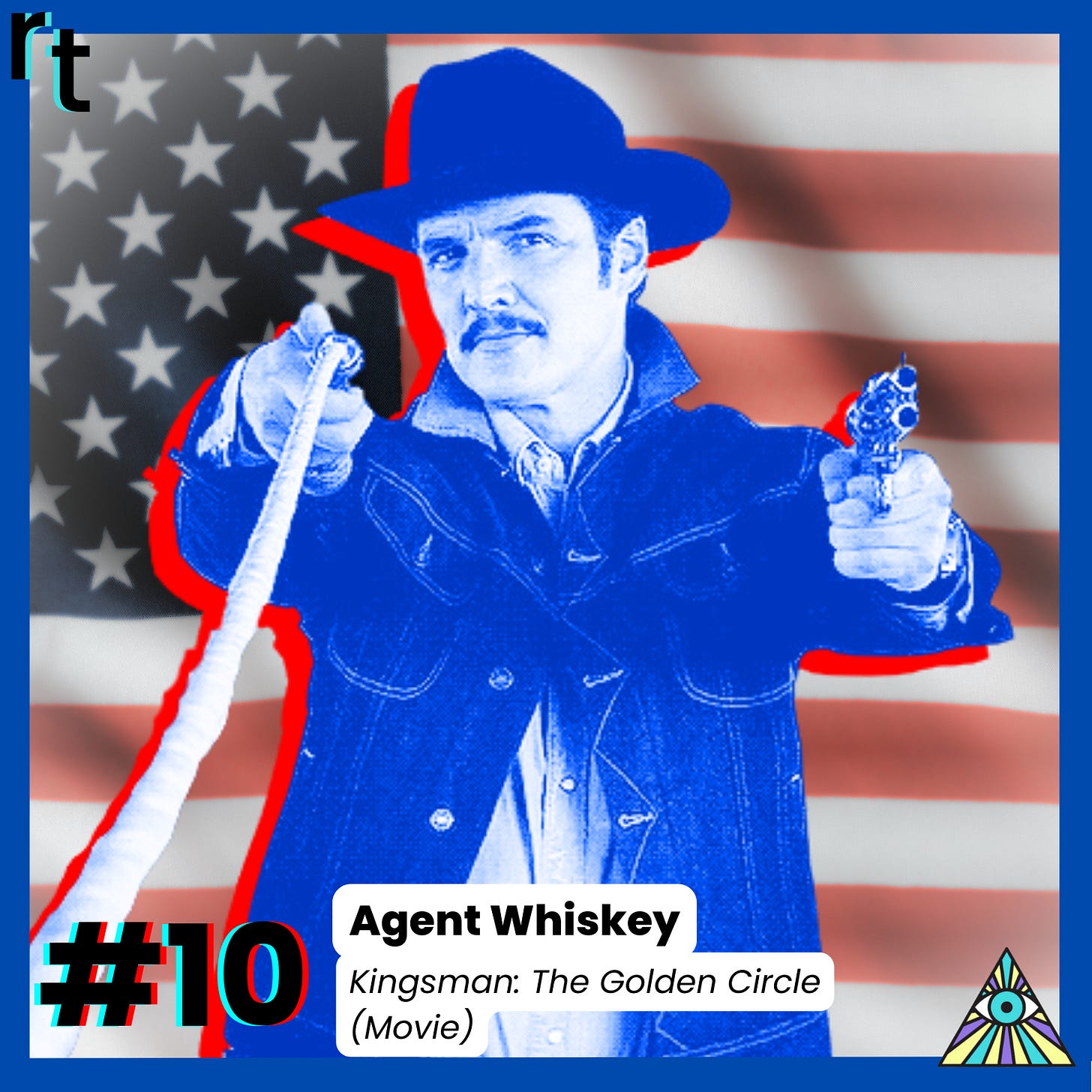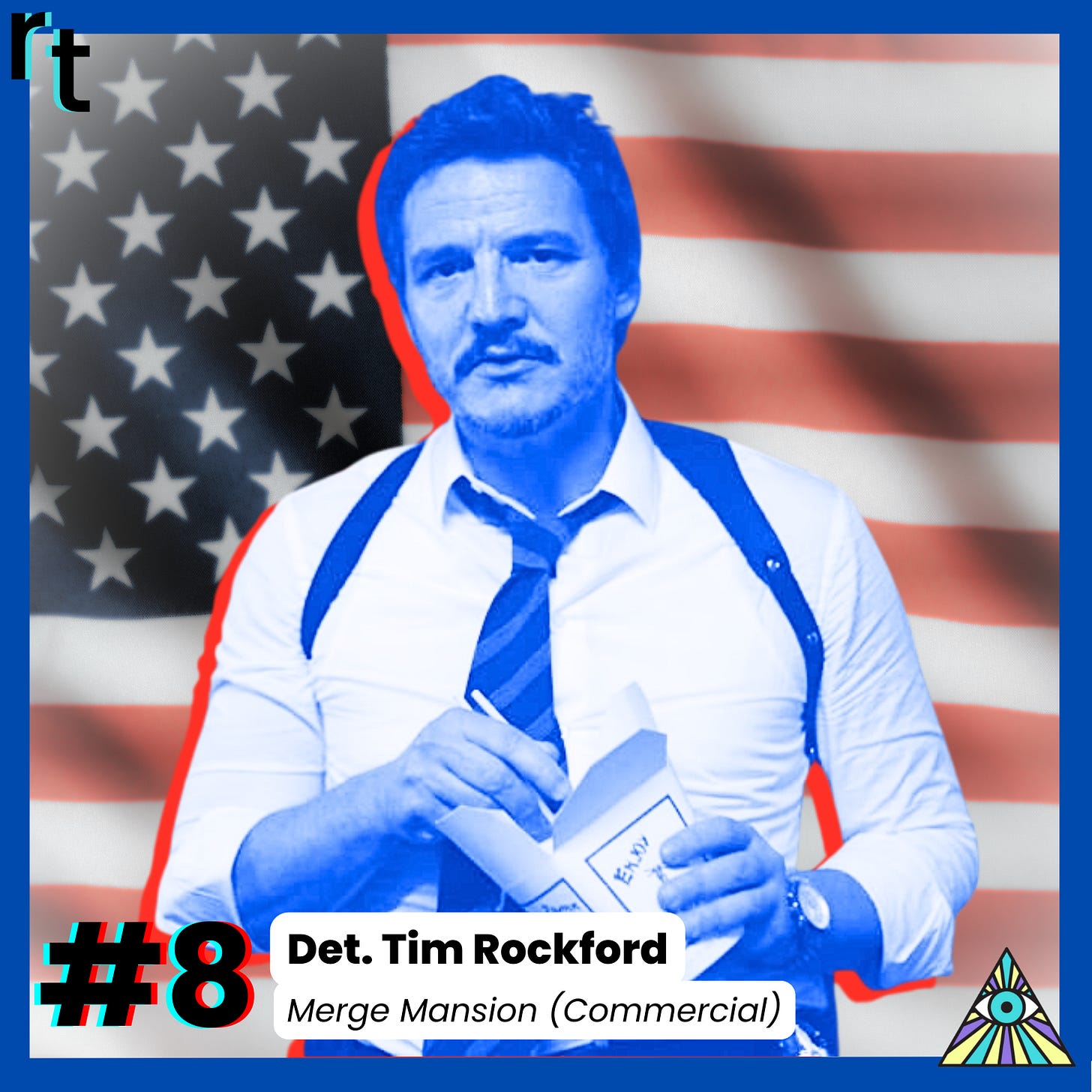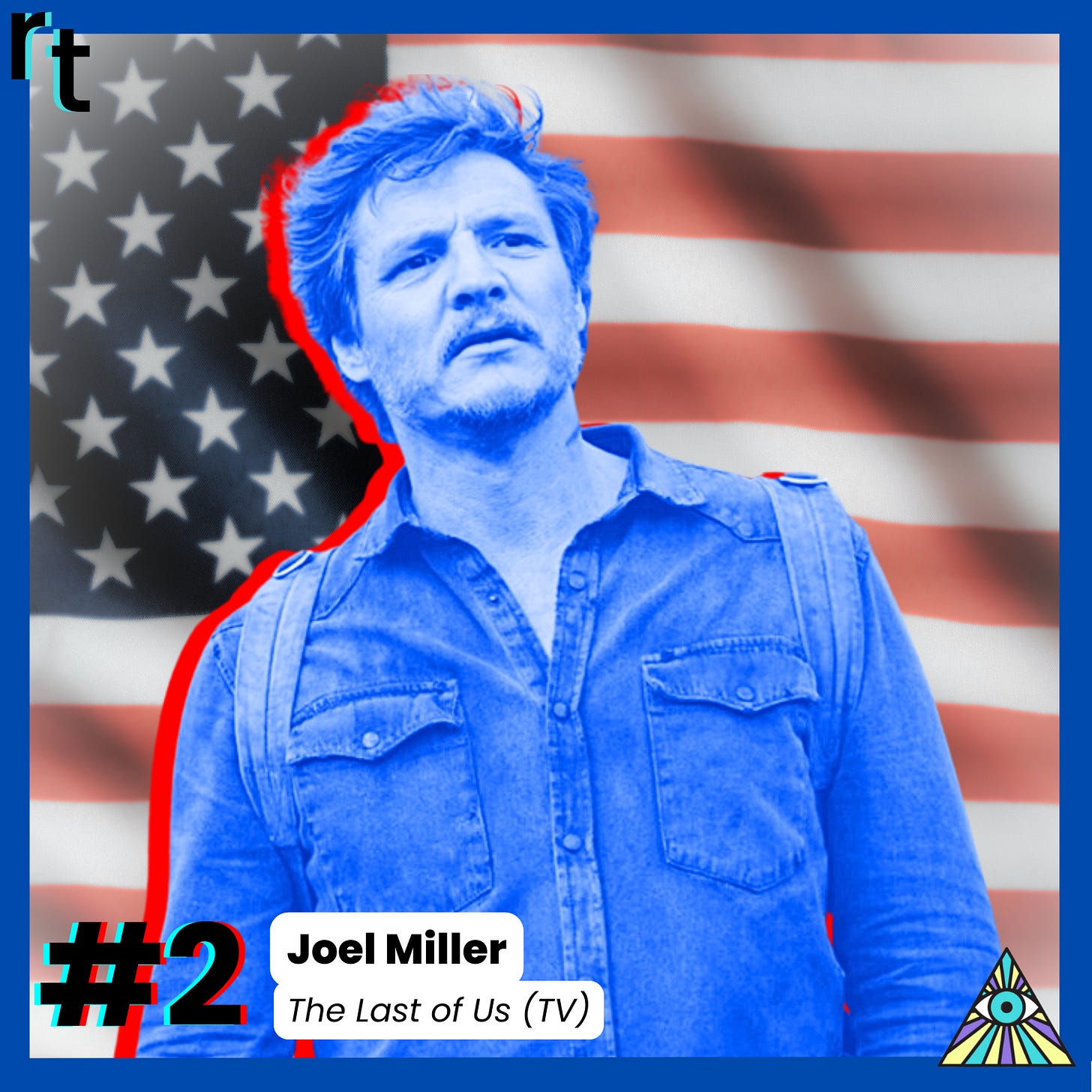Pedro Pascal Roles Ranked by How Haunted They Are by the Specter of U.S. Imperialism
The smoldering actor may be deemed the Internet's "Daddy," but he has a far more interesting relationship with Uncle Sam.

It’s been a big cultural week for elections in the United States, whether you sat through the incredibly crafted (and truly upsetting) most recent episode of Succession, voted in the tense “Young Robert De Niro vs. Young Al Pacino” Twitter poll (the answer is Pacino, duh), or a Chicagoan welcoming the inauguration of Mayor Brandon Johnson.
Democracy in America can sometimes feel like a loaded idea. For instance, in Succession’s “America Decides,” we’re reminded how quickly, in spite of our best democratic efforts, an election can be swayed by a couple of rich idiots who stand to superficially benefit from controlling the narrative. Was my “Young Meryl Streep vs. Young Diane Keaton” poll truly democratic when a Meryl Streep fan account retweeted the post, drawing dozens of Streep acolytes to heavily vote in her favor? (They’re right, but that doesn’t make it democratic.) Even with the optimism of a new, progressive mayor such as Brandon Johnson, does change ever truly occur from the inside? Are our politicians doomed to be complicit in the ongoing failures of our country, baked into its very origin myth, with no chance of being free of the interests and machinations of profiteers, war criminals, resource extractors, and the police state?
No clue.
Anyway, I’ve been rewatching Narcos! From a pure entertainment standpoint, I’ve stood by my opinion that Narcos is pretty good — not quite on the level of say, Breaking Bad, but a quality and compelling watch. I first watched it in the early days of the pandemic, around the time of catching up with season one of The Mandalorian and the release of Wonder Woman 1984 when I started thinking, “Hey, this Pedro Pascal guy has got some juice,” and found myself far from disappointed from his work on the Netflix series chronicling the DEA’s pursuit of Pablo Escobar in Colombia (in subsequent pursuit of the Cali Cartel and Rodríguez Brothers).
Well, it’s three years later and the rest of the population seems to have caught up to me (and to be fair, I caught up to an even smaller population who had been devoted to Pascal since his Game of Thrones stint). Three seasons into The Mandalorian, a stellar debut season of The Last of Us, and a shitload of announced projects later (Gladiator 2, Ethan Coen’s lesbian road trip movie, and Zach Cregger’s follow-up to Barbarian, to name three), the kids have got Pedro Pascal fever. I get it! I’ve been getting it! I want to get it! I mean — ha, who said that? Huh?? Ha. Ha ha.
Any-way…. I was looking for something to rewatch while working on a sewing project a month ago and decided to put on Narcos with some flimsy excuse that it’ll help me work on my Spanish. I’ve been enjoying the rewatch, though, appreciating the qualities I originally appreciated from the show but also more of the mind to think critically about… the other pieces of it. You know, that whole… United States militarized involvement thing? Truthfully, I remembered Narcos valorizing the United States and the DEA more than it does — which is not to say that it doesn’t valorize both entities quite a lot. But the series does share its criticisms, particularly through Pedro Pascal’s mustachioed, philandering, doesn’t-play-by-the-rulebook portrayal of DEA Agena Javier Peña. In this fictionalized characterization, Peña tries to play cowboy through his conviction that doing whatever it takes to stop Pablo Escobar is an ethical imperative, only to be confronted by the unnecessary lives lost as a direct result of his, the DEA, and the CIA’s interference.
I couldn’t with a good conscience call Narcos a thoughtful critique of U.S. imperialism, but its messiness is fascinating — oftentimes overtly placing equal responsibility of bloodshed on the shoulders of a militarized government while praising the commitment of these Heroes™️ in the same breath.
The oscillation between valor and resentment reminded me of another Netflix joint that just so happens to also feature Mr. Pascal called Triple Frontier, about a group of War in Afghanistan veterans who go on One Last Mission/heist to topple a Brazillian narco’s dynasty and claim a life-changing amount of money for themselves. Triple Frontier is, above all, a pretty rockin’ action movie featuring an insane cast of Oscar Isaac, Ben Affleck, the aforementioned Pedro Pascal, Charlie Hunnam, and Garrett Hedlund. But it isn’t a hero story and the movie toes a similar line as Narcos in both observing these men pilot helicopters and shoot bad guys in awe while harboring true rage as these men also navigate the feelings of having been groomed by the United States for utility in exactly one, horrifying area before the country swiftly abandoned them.
I found it interesting how both Narcos and Triple Frontier occupy this narrative space — probably unsuccessfully, but not without curious effort — and was particularly impressed with how Pedro Pascal as an actor manages to act through the nuances of those contradictions in subtly different ways.
And then I thought — you know, two times isn’t a lot, but it is weird that it’s happened twice.
As the world is threatened to be eclipsed by Pedro Pascal fever, there’s been an awful lot of fixation (and gross, blatant sexual harassment) around his recurring paternal roles, whether harboring Grogu as his ward in The Mandalorian to becoming a father figure to Bella Ramsey’s Ellie in The Last of Us, to the son that can finally cut through Maxwell Lord’s destructive egomania in Wonder Woman 1984. But there’s a far more insistent recurring theme in Pascal’s roles — one that speaks to the range of his abilities as an actor but also brings up interesting questions in a media landscape where we’re increasingly conscious of Copaganda: That man simply cannot get away from U.S. Imperialism and the military-industrial complex. It hasn’t just happened twice; It’s happened in nearly every role he’s had post-Game of Thrones — and quite a few prior as well, though I’m not sure we need to litigate every Law & Order episode or network TV arc he’s been in.
So it is with democracy (and all that it entails) on the mind that I’ve done the brave work of parsing through Mr. Pascal’s collection of agents, soldiers, or men whose lives have otherwise been upended by the long arm of America to give you: Pedro Pascal Roles Ranked by How Haunted They Are by the Specter of U.S. Imperialism.
And if he ends up playing an FBI Agent or something in Ethan Coen’s Drive-Away Dolls, we really gotta look into what’s going on.
Pedro Pascal vs. U.S. Imperialism — The Rankings
The Honorable Mentions:
Dieter Bravo (The Bubble), Ezra (Prospect), and Marcus Moreno (We Can Be Heroes)
The focus of these rankings follows Pascal’s career post-Game of Thrones, and while it was inevitable that a handful of these roles would have little-to-no relationship to themes of American imperialism and/or militarization, it’s remarkable that you could still make the case for roles ranging from the chaotic method actor Dieter Bravo from Judd Apatow’s maligned The Bubble — where Apatow clumsily attempts to skewer the way Hollywood’s elite excuse themselves from disparate realities such as the COVID-19 pandemic — a double-crossin’ gem extractor in the low budget sci-fi movie Prospect — where planetary colonization and depletion of resources finds some exploration — to Robert Rodriguez’s family film We Can Be Heroes — as playing the head of a team of sanctioned superheroes arguably has intrinsic ties to militarized policing, no matter how whimsical.
10. Agent Whiskey — Kingsman: The Golden Circle
Pedro Pascal joined the sequel to the hyper-violent Kingsman series as an agent from the “Statesman,” the United States equivalent of the Kingsman Secret Service, “dedicated to upholding peace and protecting the world from terrorists and other major threats.” This isn’t the only agent-of-the-state character Pascal has played, but is he haunted by U.S. Imperialism? Perhaps not as much as some of his other roles. Agent Whiskey, if anything, embodies everything about U.S. power: Ruthless, self-centered, and predicated on ulterior motives.
9. Javi Gutierrez — The Unbearable Weight of Massive Talent
Poor Javi just wanted to have a nice birthday and meet his hero Nic(k) Cage, but their bromance is threatened by… the CIA, for some reason? The CIA targets Javi as a prolific arms dealer only to find out that Javi is a relatively harmless red herring. The CIA’s ineptitude results in Javi’s livelihood being threatened and an even worse sense of betrayal in realizing his new bestie (and star of Face/Off) was going to sell him out. It all works out in the end and we’re led to believe that everyone comes out of the ordeal (except the criminal cousin) a better person with a happy ending, but Javi’s sweet innocence only looks sweeter when it’s up against meddling secret agents.
8. Detective Tim Rockford — The Merge Mansion Commercials
ACAB includes Detective Tim Rockford, no matter how much his heart is torn asunder by the grisliness of a murderous grandma or whatever.
7. Din Djarin — The Mandalorian
Though The Mandalorian doesn’t directly reference American militarism, one can’t ignore the blunt presence of literal Imperial Forces that follow Din, particularly in the first two seasons. If George Lucas wasn’t clear in the original Star Wars trilogy about the parallels drawn between stormtrooper armies and the evil that governments do, he sure as hell made sure it was obvious in the prequels. The Mandalorian is more opaque in where exactly the remnants of imperialism are positioned in the universe in the show’s timeline. However, we watch as Din Djarin evolves from a neutral party taking any ole villain’s requested bounty to willingly breaking the creed of his lifelong beliefs in order to defy and overcome imperial forces, putting The Mandalorian in the pantheon of Pascal’s roles in conversation and in conflict with these ideas. Too bad about that third season, though!
6. Pietro Alvarez — If Beale Street Could Talk
It’s a brief appearance and not one as deeply involved in a heartbreaking story about trying to make a home as a Black person in a country that will use every tool of dehumanization, but with that little screen time, Pascal contends with a role who could either be the gatekeeper against or the avenue for Fonny to be free and reunited with Tish and their baby, brokering the meeting between the mother whose son was swallowed up eagerly by a racist, carceral system and a young immigrant woman whose traumatic sexual assault was subsumed by the legal system as a tool for leverage rather than justice.
5. Maxwell Lord — Wonder Woman 1984
Maxwell Lord is an implied child of immigrants who tried to pull himself up by the bootstraps, failed, tried to make a killing in extracting oil, failed, and then used a magical object to grant himself authority over the entire planet, wiping out other countries’ governments and ecosystems in the process, including toppling over America’s very own POTUS. Wonder Woman 1984 doesn’t quite have the chops to pull off an indictment of America’s role in the oil race and the greed of Reagan’s era, but Pascal carries the movie on his back, deftly managing the insecure charm of a man in search of more who will do anything to steal it from everyone else.
4. Dave York — The Equalizer 2
Have you seen The Equalizer 2? If not, you absolutely should. Not because it’s good, per se, but because it is positively insane. Sadly, Pedro Pascal isn’t given the full breadth of insanity that other elements of the movie carry, but Dave York, the former-Marine-turned-DIA-officer-turned-mercenary, surely gives a lot to chew on.
This is one of two separate veterans Pascal has played who share dialogue about being disposable following military service, left with an exacting ability to kill without other resources. Unlike that other character (coming up), I’m not sure Dave York’s post-military career is exactly lacking — but maybe the metaphor is apt. York may have been abandoned by the government, but he’s contracted once again to support the Department of Defense. Not only was he once used as a tool of war, but now he arguably is an active contributor to the instigation and escalation of war, too.
3. Francisco ‘Catfish’ Morales — Triple Frontier
In this second vet-left-behind role, Pascal’s character doesn’t directly address the in-betweenness of valorization and abandonment as much as some of his co-stars, but he is given two of the strongest moments of pathos that underscore the complicated relationship with the military that the five characters possess.
When the initial heist goes wrong and more people are killed than intended, Frankie Morales is shown hovering directly above the camera, hesitating before delivering a single headshot to some sorry muscle who was at the wrong place at the wrong time. It’s only a split second, but Pascal’s face says it all — the regret, the shame, and the cold detachment that sinks in to protect oneself from getting bogged down in all of that violence.
Later, when a burro falls to its death from a crumbling cliff while assisting the men in transporting their newfound riches, Pascal demonstrates a reverence for life and a grief for when life is lost needlessly. He might not be the driving force of Triple Frontier, but his character’s resignation and quiet conflict brings some of the film’s most thoughtful moments.
2. Joel Miller — The Last of Us
Having not played the game, I don’t know the full extent to which The Last of Us will explore the relationship its Cordyceps apocalypse has to the U.S. military-industrial complex, and the show’s attempt to demonstrate different sides and different takes on survival vary in their understanding and critique of systems — committing to a firm understanding that humans are just as scary, if not worse, than the monsters, but shakier in its politics of how exactly that pans out.
Joel Miller, however, is the walking metaphor for being haunted by U.S. Imperialism. The weight of his daughter’s death during the early days of collapse (and no less by the hands of a U.S. soldier) has hardened him, infecting him greater than any fungi could as he eventually makes a critical, selfish decision on behalf of his newfound surrogate daughter Ellie to avoid losing a daughter once more to a system that only sees pawns, not people.
1. Javier Peña — Narcos
And alas, we come full circle to DEA Agent Javier Peña, pursuer of Pablo Escobar and the Cali Cartel. Narcos is indeed far from a perfect depiction or critique of American militarized intervention, but some of the strongest work through the three seasons of the Netflix Original is held together by Pascal’s performance as Peña, operating in the crosshairs of the ethical quandaries that arise from this gruesome part of history.
By the time Javier Peña returns in season three to lead up the DEA’s hunt of the Cali Cartel, he is more and more burdened by the understanding that there is always collateral damage; that the U.S. government could give less of a shit about the people affected by drug trafficking, only the political optics; and that ultimately, he is still an extension of the government’s arm. Any challenge to the rules, to the way the Americans want it done? That’s always a risk that more Colombians might die. Narcos may still come out with a belief that it’s all worth it and that the DEA are heroes, but Peña (and Pascal’s work in the role) isn’t spared the ugliest and most challenging contradictions of this position. ✿
It’s been almost a decade since Pedro Pascal’s star began its ascent following Game of Thrones, and for as many father figures he’s played or comm system ADR work he’s done, there are even more roles where he just can’t escape the damn fist of ‘Merica. There’s exciting work on his horizon, including Strange Way of Life which just premiered at Cannes this week, but it’s a testament to Pascal’s abilities as an actor that for all the DEA/DIA/Detective/Mercenary roles he’s played, he’s always doing something interesting and unique with every character.
Until next time!













